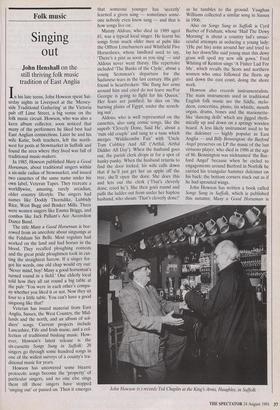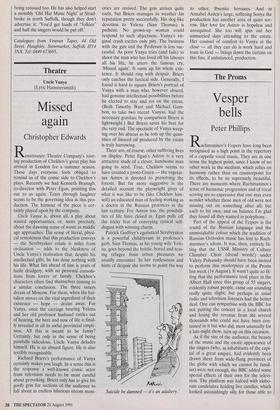Folk music
Singing out
John Henshall on the still thriving folk music tradition of East Anglia In his late teens, John Howson spent Sat- urday nights in Liverpool at the 'Mersey- side Traditional Gathering' at the Victoria pub off Lime Street, a big venue on the folk music circuit. Howson, who was also a keen album collector, soon noticed that many of the performers he liked best had East Anglian connections. Later he and his wife Katie, both teachers, left the north- west for posts at Stowmarket in Suffolk and found the area where they lived was full of traditional music-makers.
In 1985, Howson published Many a Good Horseman, about traditional singers within a six-mile radius of Stowmarket, and issued two cassettes of the same name under his own label, Veteran Tapes. They recreate a worldlywise, amusing, rarely arcadian, older country lifestyle. The singers had names like Doddy Thorndike, Lubbidy Rice, West Bugg and Bonker Mills. There were women singers like Emma Briggs, and combos like Jack Pallant's Ace Accordion Dance Band.
The title Many a Good Horseman is bor- rowed from an anecdote about singsongs at the Felsham Six Bells. Most regulars had worked on the land and had horses in the blood. They recalled ploughing contests and the great pride ploughmen took in cut- ting the straightest furrow. If a singer for- got his words, one old chap would cry out: `Never mind, boy! Many a good horseman's turned round in a field.' One elderly local told how they all sat round a big table at the pub: 'You were in each other's compa- ny whether you liked it or not. Now they sit four to a little table. You can't have a good singsong like that!' Veteran has issued material from East Anglia, Sussex, the West Country, the Mid- lands and the north, and an album of sol- diers' songs. Current projects include Lancashire, Fife and Irish music, and a col- lection of traditional busking music. How- ever, Howson's latest release is the six-cassette Songs Sung in Suffolk: 20 singers go through some hundred songs in one of the widest surveys of a county's tra- ditional music for years.
Howson has uncovered some bizarre protocols: songs become the 'property' of particular singers, and no one else sings them till those singers have stopped `singing out' or passed on. Then it emerges that someone younger has 'secretly' learned a given song — sometimes some- one nobody even knew sang — and that is how songs live on.
Manny Aldous, who died in 1989 aged 81, was a typical local singer. He learnt his songs from much older men at pubs like the Offton Limeburners and Whitfield Five Horseshoes, whose landlord used to say, `There's a pint as soon as you sing' — and Aldous never went thirsty. His repertoire included 'The Banks of the Clyde', about a young Scotsman's departure for the Sudanese wars in the last century. His girl- friend is heartbroken: 'She flung her arms around him and cried do not leave me/For Georgie is going to fight for his Queen.' Her fears are justified; he dies on 'the burning plains of Egypt, under the scorch- ing sun'. Aldous, who is well represented on the cassettes, also sang comic songs, like the superb 'Cleverly Done, Said He', about a `rum old couple' and sung to a tune which merges Viddicombe Fair' with 'Uncle Tom Cobbley And All' (`Artful, Artful Didder All Day'). When the husband goes out, the parish clerk drops in for a spot of hanky-panky. When the husband returns to find the door locked, his wife calls down that if he'll just get her an apple off the tree, she'll open the door. She does this and lets out the clerk (`That's cleverly done, cried he'). She then goes round and pulls the ladder out from under her hapless husband, who shouts 'That's cleverly done!' as he tumbles to the ground. Vaughan Williams collected a similar song in Sussex in 1906.
Also on Songs Sung in Suffolk is Cyril Barber of Felsham, whose 'Hail The Dewy Morning' is about a country lad's unsuc- cessful attempts at seducing a young lady: `(He put his) arms around her and tried to lay her down/She said young man this dewy grass will spoil my new silk gown.' Fred Whiting of Kenton sings 'A Fisher Lad For Me', which recalls the Scots and northern women who once followed the fleets up and down the east coast, doing the shore work.
Howson also records instrumentalists. The main instruments used in traditional English folk music are the fiddle, melo- deon, concertina, piano, tin whistle, mouth organ, drums, bones and the marionette- like 'dancing dolls' which are jigged rhyth- mically up and down on a springy wooden board. A less likely instrument used to be the dulcimer — highly popular in East Anglia — and Billy Bennington: the Barford Angel preserves on LP the music of the last virtuoso player, who died in 1986 at the age of 86. Bennington was nicknamed 'the Bar- ford Angel' because when he cycled to engagements around Barford in Norfolk he carried his triangular hammer dulcimer on his back: the bottom corners stuck out as if he had sprouted wings.
John Howson has written a book called Songs Sung in Suffolk, which is published this autumn; Many a Good Horseman is John Howson (r.) records Ted Chaplin at the King's Arms, Haughley, in Suffolk being reissued too. He has also helped start a monthly 'Old Hat Music Night' at Strad- broke in north Suffolk, though they don't advertise it: 'You'd get loads of "folkies" and half the singers would be put off.'



















































 Previous page
Previous page